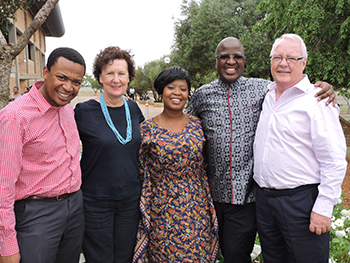Important Contact Details:
South Campus Services
Academic Advice
Chwaro Shuping: +27 51 505 1430
shupingcn@ufs.ac.za
CUADS (Center for Universal
Access and Disability Support)
Martie Miranda: +27 51 401 3713
Health and Wellness
Lizet Holtzhausen (staff wellness):
+27 51 401 2529
wellness@ufs.ac.za
Annelise Visagie (student wellness):
+27 51 401 3258
Health: +27 51 401 2603
HIV/AIDS Office: +27 51 401 2998
vandenbergfjj@ufs.ac.za
Protection Services
24-hour line: +27 51 505 1217
ICT Services
Quincey van der Westhuizen:
+27 51 401 7700
Video clip
Photo Gallery
The South Campus of the University of the Free State (UFS) recently welcomed new first-year and returning senior students during an event in the Madiba Arena. This year marks another highlight for the campus, with the accommodation of 252 students in a brand-new residence named Legae (meaning “Home”) on the property.
Prof Daniella Coetzee, Campus Principal, reminded the gathered students, “You are a fully-fledged Kovsie, and this is the first day of the rest of your life. You are now going to really work on your dreams.”
She went on to relate the life story of Albert Einstein, renowned physicist, making the point, “When you work, when you persist, when you take it one day at a time, you never lose sight of your dreams, and you will reach your dreams. I can promise you one thing, dear Kovsies, that if you work hard, plan hard, and you put your mind to it, it will definitely be worthwhile.”
Setlogane Manchidi, Head of Investec’s Corporate Social Investments division and guest speaker, told his colourful life story and academic journey. He described his ‘a-ha moment’ in high school, “when the penny dropped and everything started making sense” on a visit to his mother’s employer in Johannesburg, after going to the cinema to watch a movie: “This is the life I want to live.”

Andrew Tlou, Investec Social Investment; Carol Bunn,
UFS Institutional Advancement; Setlogane Manchidi,
Head of Investec’s Corporate Social Investments division;
Tshegofatso Setilo, UAP Programmes Manager; and
Francois Marais, Director: Access Programmes,
at the South Campus opening and orientation day.
Photo: Eugene Seegers
This led to a new resolve in his scholastic efforts at the rural school back home in Ga-Phahla, Limpopo, and he started studying over weekends and by candlelight at night. Mr Manchidi shared this lesson with the students, “At that point, I lost my so-called ‘friends.’ I learnt this: Peer pressure is real. If you want to deal with peer pressure, surround yourself with the right peers! Surround yourself with people who have your best interests at heart. Surround yourself with people who will not turn you back from your path.” He later succeeded in obtaining a bursary to study at the University of Cape Town (UCT).
Mr Manchidi concluded by exhorting students to aspire to greatness, “Every time you settle for what is expected, you rob yourself of the opportunity to prove yourself out of the ordinary. Choose to exceed expectations. Give it your all!”